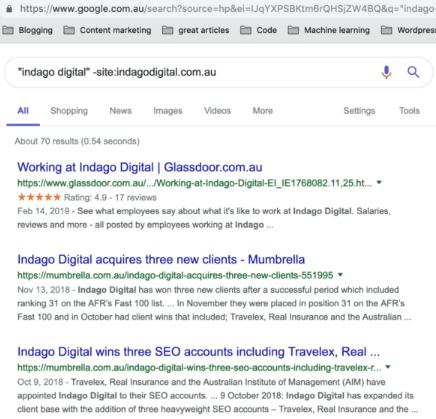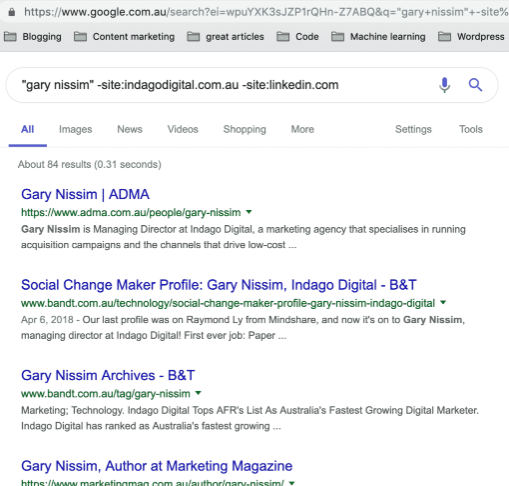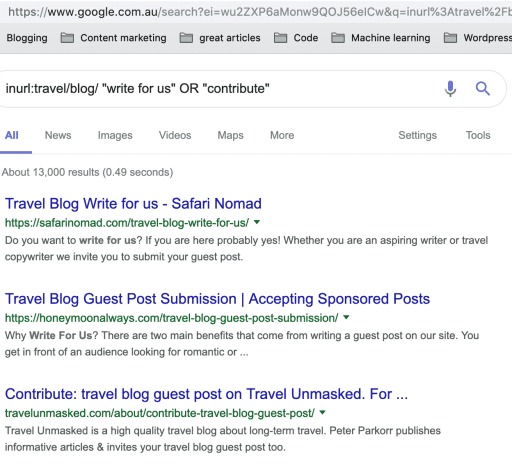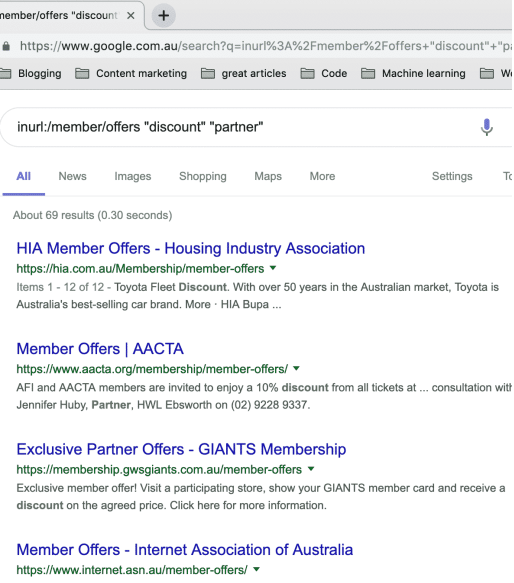Search Operator Basics
If you’re unfamiliar with search operators, there’s an excellent introductory article written by Search Engine Journal to get you started. You likely already know the basics (like using “, AND, and OR), but let’s apply this theory to some of the most common link-building strategies:
- Brand Mentions
- Directory Submissions
- Guest Posting
- Membership Discount Pages
Before you get started, make sure you read Chris Ainsworth’s guide to extracting search results here. Download his SERPs extractor tool, set your Google search settings to 100 results, and download Chrome and the Chrome extension Ginfiniti.
Got all that? Good. Now let’s get stuck into the bread-and-butter of link building – brand mentions…
Brand Mentions 101
This strategy only works well for campaigns where the client continually mentions an established brand in the media. Running awareness campaigns, sponsoring events, and including market research as part of your content marketing plan are great ways to increase the instances your brand mentions online.
So, how do you find where your brand is mentioned?

The basic formula is:
“brand name” –site:brandsite.com
If you only want results relevant to a specific country in international SEO, set Google’s Country Code Top Level Domain (CCTLD) to that country (e.g. Australia – google.com.au).
However, if you know them, some additional tricks can boost your results and increase the number of links you acquire. For example, try including the name of the CEO or founder if they’re notable.

You might want to include additional sites for Google to avoid, like LinkedIn or Glassdoor, if they’re taking up too much space in your results.
The formula for a CEO search is:
“CEO name” –site:brandsite.com
But what if your brand name is a word used always, like Crown or Koala?
Try using the AROUND(x) function to make your search results more relevant, for example:

Here, you can see that Google is returning all instances where the word and mattress occur within 20 words of one another.
Neat, right?
Well, that’s brand mentions down on directory submissions…
Directory Submissions
Directories get a bad rap a lot of the time, but they should be a foundational part of any campaign. Check out Indago’s Periodic Table Of Link Building & Acquisition Tactics for more on the subject.
The point is that you want high-quality, highly relevant directories. Sites like Hotfrog and Yellow Pages get millions of visitors every year. They are well worth the effort in creating a listing, especially if your business has a physical storefront or multiple locations. Not sold? Then, move along. For everyone else, here’s how to find relevant directories:
Looking for something local? Give this a try…

If you were a bourgeoning start-up in the fintech space, it’d be worthwhile getting listed on those sites. Using the + function will give all variations of the location’s name. For example, Google will search for ‘Sydney’ and any other variations of words like ‘SYD’. Make sure to also search from the relevant Google CCTLD to narrow the results.
The formula to specify a local directory in a specific industry is:
+location “directory” AND “industry.”
If you’re not fussed about the listing being location-specific, then it’s even easier plugin:
“directory” AND “industry”
This should return you a decent list of directories to submit a listing too, and always aim for industry and geo-specific directories.
Now that the directories are done and dusted, let’s move on to guest posting.
Guest Posting
Regarding link acquisition, guest posting has a fairly low ROI for the amount of time and effort required to acquire a link. However, Google’s PageRank algorithm rewards authoritative and relevant backlinks above overall link quantity. Therefore, it’s well worth the extra effort if the website is an industry authority with a highly engaged audience. There are also additional benefits for personal branding and conversions if you can include a CTA in your products or services.

The classic formula for finding industry-relevant guest posting opportunities is: inurl:industry/blog/ “write for us” OR “contribute”
As seen above, I’ve sourced some potential travel blogs to approach, but this same formula can be applied to various industries. There is usually a long lead time involved in getting your article published, but this strategy definitely isn’t going anywhere as there is so much additional non-SEO value involved other than the link itself in getting your writing featured online.
Now that you’re a guest posting god, it’s time to learn something a little more left-field.
Membership Discount Pages
If you’re an eCommerce or SaaS business and not afraid of renegade discount codes eating up your revenue per sale, then partnering with other businesses to be part of their “member offers and benefits” sections is a great way to earn high-quality links. I ran a similar project with this, and the results produced an average DR of 51. If you do run with this strategy, make sure that a backlink is part of the agreement (not reciprocated), unless you believe that the listing will be particularly profitable.
Enough about the strategy; here’s how you find all those juicy link ops:

- Set Google to the relevant CCTLD, and
- Plug in the above formula: “inurl:member/offers “discount” “partner”
It’s as easy as that. Remember that Google personalises results to each user, so they’re guaranteed to differ from person to person. You’ll have to do some data cleaning, but gaining links from these sites is well worth it.
Well, there you have it. That is just the tip of the iceberg of Google search operator functions and how they can be applied for SEO.
Written by
Peter Dimakidis





